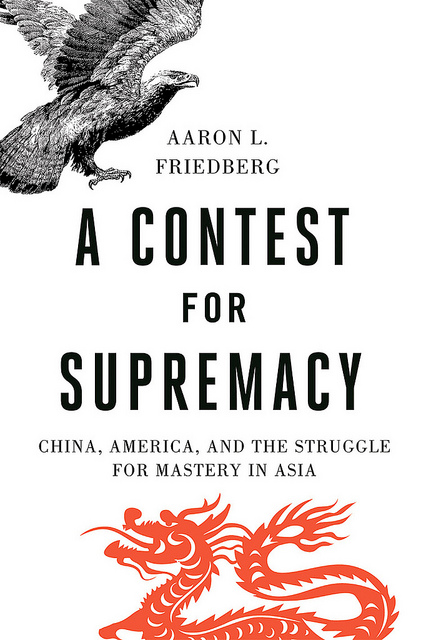
Book review: A Contest for Supremacy. China, America, and the Struggle for Mastery in Asia. By Aaron L. Friedberg. W.W. Norton & Company, 2011. 385 pages. R$ 32,46 (www.amazon.com.br, kindle)
Britain launched the Industrial Revolution and built a global empire with a comparatively small population, and the United States created the myth of the sole superpower with a population on the order of 100 million people (a century ago). What will the industrialization of China, with its 1.3 billion people, mean for the world?
Prof. Jin Canrong, China’s People’s University
———–
How can we explain the United States’ diplomatic disaster in the context of the China-led Asian Infrastructure Investment Bank (AIIB)? How could policy makers in Washington so seriously misjudge their capacity to convince countries around the world — ranging from Britain, Germany, and Brazil to South Korea, Japan and Australia — not to join the new institution? Perhaps more perplexing still, why did it frame the creation of the AIIB as a diplomatic contest in the first place? Had the United States early on sought membership of the bank, or merely decided not to comment on the issue, observers around the world would not pay as much attention to the institution today, or interpret it as a watershed moment in the transition from unipolarity to multipolarity.
Washington’s strategy vis-à-vis the AIIB — to frame it as a contest with China — points to a group of intellectuals and policy makers who regard the rise of China mostly in the context of inevitable tension and possible conflict. One example of this school of thought is Aaron Friedberg, a Princeton professor with some policy experience, who wrote, a few years back, the book A Contest for Supremacy about US-China relations in Asia.
It only takes a few pages for the reader to grasp Friedberg’s unequivocal opinion. An intense geopolitical rivalry between the United States and China is already underway in Asia, and unless the United States responds more vigorously than it has to date, the military balance in the Western Pacific is going to start to tilt sharply in China’s favor:
If the United States can stay in the game, it should have a good change to ultimately win. But if America and its allies permit their position to erode until it is too late to respond, they could yet lose the struggle for mastery in Asia.
Non-American readers will find the tone of A Contest for Supremacy oddly nationalistic and seemingly aligned with US government rhetoric. If, the author writes, “we permit China as presently constituted to dominate Asia, our prosperity, security and hopes of promoting the further spread of freedom will be seriously impaired.” Indeed, it seems to be precisely this type of sweeping rhetoric that makes future confrontation difficult to avoid.
Many of Friedberg’s assertions lack a proper explanation. He incessantly points out that the “ideological chasm” — the fact that China is not a democracy — significantly enhances tensions between Washington and Beijing. He does not consider that an authoritarian government in China may reduce nationalist sentiment that may actually help, not hinder, the bilateral relationship. The author often quotes Thucydides, yet seems to forget that the national interests of a rising power do not necessarily depend on its political regime. His argument that a democratic China would be less likely to launch a surprise attack on the United States seems unconvincing.
Friedberg recognizes that a strong economic relationship between the United States and China may contribute to avoiding conflict, yet in the end, he even turns trade into a potential cause for friction, arguing that “if disputes over trade imbalances, exchange rates, investment flows, access to and control over scarce commodities become increasingly vituperative (….), the entire relationship could unravel with surprising speed.”
Though well-written, A Contest for Supremacy has a somewhat bland feel to it, and his historical analysis is a summary of well-known facts. Expressions like “if it is true that democracies really never fight each other” leave the reader uncertain of what the author actually believes — after all, can two democracies start a war between each other or not?
Those who have read Henry Kissinger’s On China can safely skip the first several chapters — still, in the chapter “Congagement”, Friedman nicely describes the contradictory interests that shaped US policy towards China during the Clinton years. The author comes out as a supporter of a mix of engagement and containment: “there is no alternative approach that is clearly superior on its merits.” He furthermore bemoans that “respectable opinion” in academic, political and policy-making circles is still solidly behind engagement and wary of balancing. What Friedberg overlooks is that perhaps engagement has more supporters simply because it is the more sensible choice — and not because it is politically more correct. The author stubbornly writes that “China is too important to leave it to the China experts” — yet it was precisely the China watchers that urged the United States to join the AIIB as soon as Xi Jinping announced its creation. Such a — more collaborative — move would have avoided the rare diplomatic humiliation Washington experienced during the global rush to join China’s new bank.
Friedberg rightly points out that, as China’s economic strength and capacity to help promote development in its neighborhood increases (through initiatives like OBOR, the Silk Road Fund, the AIIB and CICA), the United States may find it ever more difficult to justify its continued military presence around China in the name of global public interest – such as preventing a nuclear arms race, fighting terrorism, or assuring maritime security. If Beijing manages to be seen as a boon, rather than a threat, for regional economic development and political stability, Washington’s position will weaken — even though, despite Japan’s surprising decision to join the AIIB, such a scenario still seems unlikely in the medium term.
In the end, though, Friedberg’s focus on regime change in China seems excessive and misplaced, largely because there is no evidence that democratization would help U.S. national interest. (Read also: Should the world root for democracy in China?) “The ultimate aim of the American strategy”, he writes, “is to hasten a revolution, albeit a peaceful one, that will sweep away China’s one-party authoritarian state and leave behind a liberal democracy in its place.” His assertion that when far-reaching political change comes to China, “it will doubtless owe something to America’s long-standing policy of engagement” seems delusional and vastly exaggerates US influence in Chinese domestic affairs. Friedberg never recognizes the obvious: Even a democratic China would seek regional hegemony and work towards limiting US influence in Asia.
Eluding the two facile and overly simplistic extremes of either confronting or joining existing order, the creation of several China-centric institutions will allow China to embrace its own type of competitive multilateralism, picking and choosing among flexible frameworks, in accordance with its national interests. That will make it extremely difficult for the United States to limit China’s influence without being seen as a self-interested bully.
Still, Friedberg is certainly right that while the long-term odds are in Beijing’s favor, Chinese hegemony is far from preordained. Demographic challenges, rising inequality, environmental disaster, political protests and regional conflict are all factors that could dramatically slow down China’s rise. The greatest dilemma that policy makers in Washington face is that, from a purely economic point of view, the United States should do everything possible to help China continue its growth trajectory.
Read also:
Book review: “Why the Rise of the Rest Is Good for the West” by Charles Kenny
Why Britain is right to join China’s new development bank
China vs. India: Will the “contest of the 21st century” lead to war?
Photo credit: project-syndicat.org









